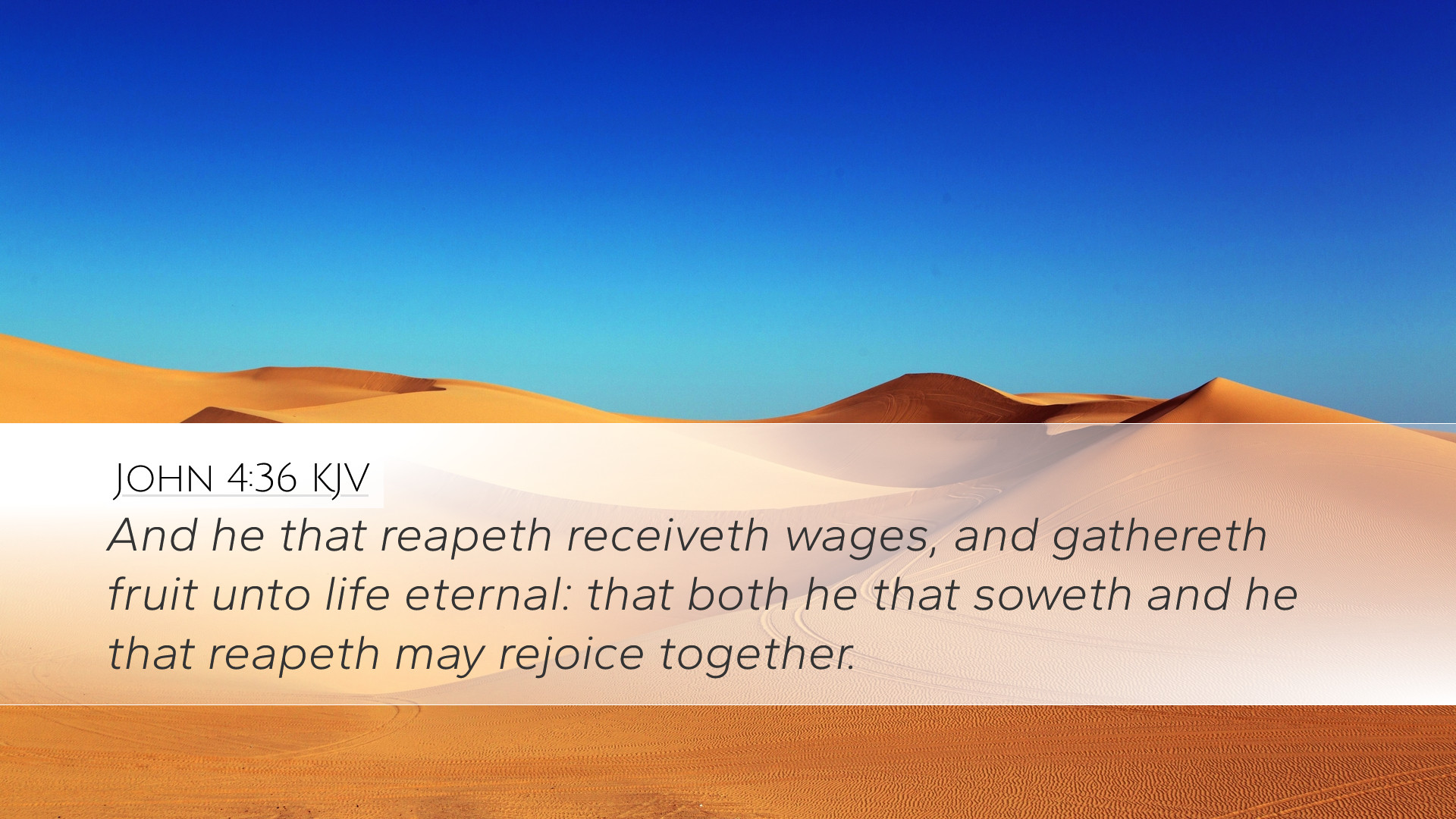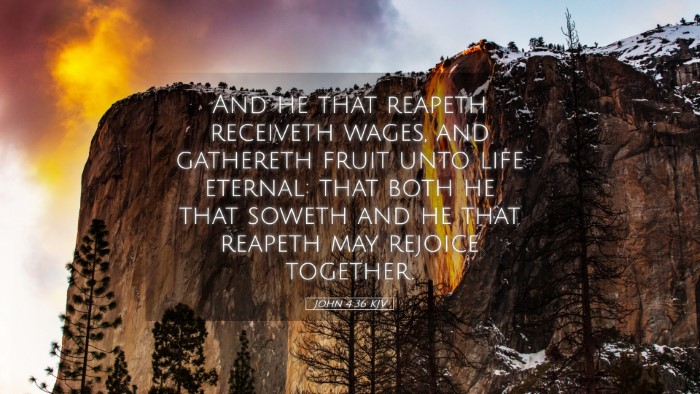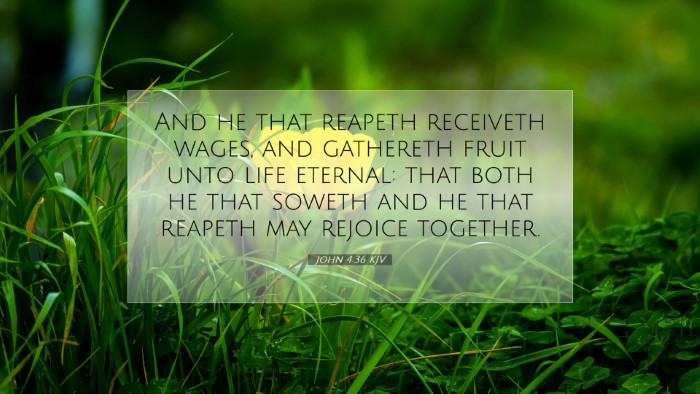Commentary on John 4:36
Verse: "And he that reapeth receiveth wages, and gathereth fruit unto life eternal: that both he that soweth and he that reapeth may rejoice together."
Introduction
The Gospel of John presents rich theological insights, one of the most profound being in John 4:36. This verse encapsulates the intimate relationship between evangelism, divine reward, and the joy found in the harvest of souls. Using the insights from respected public domain commentaries such as those by Matthew Henry, Albert Barnes, and Adam Clarke, we explore the layers of meaning this verse imparts to pastors, theologians, and scholars.
Contextual Analysis
To fully appreciate John 4:36, we must consider its context within John 4. This chapter recounts Jesus' interaction with the Samaritan woman at the well, followed by the subsequent harvesting of souls in Samaria. The narrative demonstrates Jesus' ministry to the marginalized and highlights the joy and communal aspect of salvation. Henry emphasizes how this context underscores the urgency of gospel proclamation and the collective experience of sowing and reaping.
Exegesis of Key Phrases
The verse can be dissected into a few key phrases that warrant deeper examination. In its essence, it communicates three interconnected truths.
-
He that reapeth:
Interpretatively, this refers to those actively engaged in the harvest of souls—witnesses of Christ. Adam Clarke notes that the reaper is not only the one who brings in the harvest but also one who contributes to gathering souls for the kingdom of God.
-
Receiveth wages:
The concept of receiving wages speaks to the divine compensation awaiting those who labor in the Lord’s vineyard. Barnes explains that this phrase speaks not merely of physical compensation, but rather spiritual rewards, emphasizing eternal implications beyond temporal gains.
-
Gathereth fruit unto life eternal:
This metaphor illustrates the ultimate goal of evangelism—eternal life for souls. It reflects the joy of producing spiritual fruit that lasts. Henry points out that this “fruit” represents both new believers and the holiness developed in their lives as a result of salvation.
The Interconnectedness of Sowing and Reaping
At the heart of this verse is the unique relationship between the sower and the reaper. It emphasizes a collective mission, underscoring that both roles are integral to God’s kingdom. Henry reflects on the joy inherent in this partnership; the rejoicing is mutual and inclusive.
Given the agrarian society of ancient times, the imagery of sowing and reaping would resonate deeply with Jesus' listeners. Clarke notes that this principle extends beyond time—referring to the ministry of the prophets and the continual work of those who share the gospel throughout history.
Theological Implications
John 4:36 invites deep theological reflection on the nature of salvation. Firstly, it reassures believers that participation in God’s work yields not only eternal rewards but also spiritual satisfaction. Secondly, it anchors the Christian faith in a communal experience, fostering an environment where believers work together for a common purpose.
Similar to the agricultural metaphor, Barnes draws a parallel between this labor and the transformative work of the Holy Spirit in the lives of the faithful. There is an inherent assurance that God is at work through both the sower and the reaper, facilitating growth in the spiritual realm.
Practical Applications for Ministry
This verse provides several significant applications for ministry today:
- Collaboration in Ministry:
Pastors and church leaders should recognize the importance of partnership in evangelism. Understanding that we are part of a larger body can foster collaboration in outreach endeavors.
- Value of Every Role:
Every believer has a role to play in God’s kingdom work. Students and theologians are encouraged to see themselves as contributors, whether through teaching, mentoring, or direct evangelism.
- An Eternal Perspective:
Ministry should be approached not solely as a job but with a view toward eternal significance—realizing that each soul has eternal value and that our labors contribute to that reality.
- Rejoicing Together:
Encouraging a culture of celebration within the church for the successes of both sowers and reapers can build morale and create unity within the congregation. This aspect of joy is critical as we cultivate an environment of encouragement.
Conclusion
John 4:36 serves as a poignant reminder of the call to actively participate in the harvest of souls. This verse invites a deep appreciation for the dynamics of ministry and the mutual joy found within God’s kingdom work. As we reflect on the insights from Henry, Barnes, and Clarke, we are encouraged to embrace our roles as sowers and reapers, laboring together for the sake of eternal fruit. This understanding not only embodies the essence of Christian stewardship but also galvanizes our commitment to evangelism that transcends ministry—ultimately pointing to the hope and joy of eternal life.


